Sustainability continues to play a huge role in our day-to-day lives as we strive to become more aware of the wider impact we have on the environment.
And it seems the much needed move to make more environmentally positive choices is also growing in importance amongst both UK employers and employees alike in 2023. We recently analysed Google Search Trend data and learnt that UK searches for topics such as “sustainable working” are up 21% in the last 12 months, showing the growing interest in more sustainable choices when it comes to our working lives.
From a business perspective, we endeavor to put sustainability at the forefront of our minds and we’re always looking for ways in which to improve our environmental impact. With this in mind, we were eager to discover where in the UK offers the most sustainable working environment for their employees, examining key sustainability factors across 49 major UK towns and cities in order to do so.
Alongside this, we've also surveyed 2,000 UK adults to reveal how important sustainability is when it comes to businesses and employers.
Read on to learn more about the study...
Over Two Fifths of UK Adults Believe It’s Very Important That Businesses Operate Sustainably

Our poll revealed that in total, nine in ten (92%) UK adults believe that it is important to them on some level that businesses and employers in their area operate sustainably and have environmentally responsible policies in place. Of this number, more than two-fifths (42%) stated that this issue to be ‘very important’ to them when considering businesses in their area, whilst a further two in five (38%) believe this to be ‘fairly important’ to them.
The city of Southampton led the way with the highest number of residents who felt this was a matter of high importance to them, with over half (57%) agreeing to this. And alongside Southampton, those in Liverpool, Birmingham, Norwich and London also boasted a high percentage of residents who felt the strongest about this issue, averaging at 46%.
However, just one in twenty (5%), stated the issue of businesses local to them operating sustainability and with environmentally friendly policies in place is of no importance to them. Although this is a minority vote, it appears to be most common in Norwich, where almost one in ten (9%) admitted it held little importance to them whether a business or employer in their area operates sustainably and has environmentally responsible policies in place.
Those falling into the 65 and over category had the highest percentage of respondents stating they did not believe this to be important at all to them (7%).
The UK’s Most Sustainable Working Towns and Cities, Revealed
As part of our research, we compared 49 major UK towns and cities to discover the UK’s most sustainable location to work in. To determine this, we’ve analysed several key factors relating to sustainability, awarding a series of points to create our final table of rankings:
• Emissions data per km² (kt CO2e) (2020)
• Number of parks and green spaces (per 100,000 residents)
• Number of Cycle Routes (per 100,000 residents)
• Number of EV charge points and stations (per 100,000 residents)
• ‘Sustainable’ related job ads
• B Lab certified employers, an organisation offering certification as way to measure a company’s social and environmental impact.
| Rank | UK Town/City | Emissions per km² |
No. of GreenSpaces & Parks |
No. of Cycle Routes | No. of EV Charge Points | No. of EV Charging Stations | No. of Jobs Listed as “Sustainable Workplace" within 25 miles | No. of Jobs Listed as "Sustainable Employer" within 25 miles | No. of B Lab Certified Employers | Overall Score |
|---|---|---|---|---|---|---|---|---|---|---|
| 1 | Bath | 2 | 19 | 739 | 80 | 17 | 356 | 747 | 11 | 86% |
| 2 | St Albans | 5.4 | 60 | 773 | 53 | 20 | 2,640 | 4,222 | 1 | 79% |
| 3 | London | 17.8 | 3,000 | 9,578 | 11,559 | 429 | 248 | 564 | 683 | 78% |
| 4 | Oxford | 12.6 | 31 | 898 | 78 | 32 | 257 | 603 | 12 | 75% |
| 5 | Cambridge | 12.6 | 92 | 1,278 | 74 | 13 | 318 | 445 | 7 | 74% |
| 6 | Bristol | 6.6 | 40 | 2,401 | 88 | 56 | 409 | 804 | 46 | 70% |
| 7 | Newport | 4.6 | 12 | 297 | 60 | 10 | 411 | 808 | 2 | 64% |
| 8 | Exeter | 9.3 | 43 | 401 | 57 | 22 | 107 | 147 | 7 | 63% |
| 9 | York | 3 | 25 | 1,331 | 66 | 14 | 259 | 605 | 1 | 62% |
| 10 | Manchester | 18.9 | 160 | 510 | 69 | 77 | 519 | 1,163 | 21 | 62% |
1. Bath
Our research found Bath to be the UK’s most sustainable city to work in, achieving an overall score of 86% in our index.
This city had the lowest emissions per km² in the top ten cities, and not only that, is home to 682 cycle routes for every 100,000 residents, making this city perfect for those preferring to commute by bike. Our research also found that over 1,000 job adverts in Bath are currently listed as either ‘sustainable workplace’ or ‘sustainable employer’, showing just how in demand sustainable working life is within this city.

2. St Albans
Following behind Bath in second place is St Albans with an overall score of 79% in our index.
Although this city only has one B Lab certified employer, St Albans has the highest number of job adverts listed as “sustainable workplace” and “sustainable employer”, with over 6,800 within a 25-mile radius.
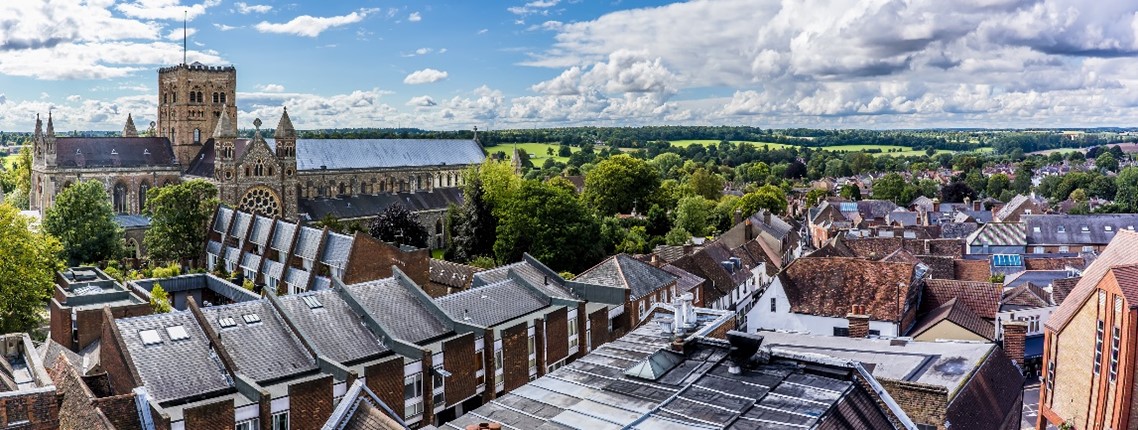
3. London
In third place is London. Although the UK’s capital had one of the highest amounts of emissions, at 17.8 per km², this city also had the highest number of parks and green space (3,000) cycle routes (9,578), EV charging points (11,559), and B Lab certified employers (683), meaning this city achieved an overall score of 78% in our index.

4. Oxford
Oxford ranked fourth in the index, with an overall score of 75%. This city is home to 592 cycle routes per 100,000 residents, allowing workers in Oxford to choose more sustainable forms of transport for their commute. Not only that, but Oxford has the fourth highest number of EV charging points across the city (78), meaning those travelling by electric vehicle won’t be left out of charge on their daily commute.

5. Cambridge
In fifth place is Cambridge, which scored 74% overall in our study. Cambridge boasts a generous 1,022 cycle routes per 100,000 residents, making sustainable commuting viable for workers. Alongside this, Cambridge is home to 74 parks and green spaces per 100,000 residents across the city.

6. Bristol
Bristol appeared at sixth on the list of most sustainable cities to work in, scoring 70% in our rankings. This city has the third highest number of cycle routes in the study, with over 2,400 to choose from (515 per 100,000 residents). Bristol is also home to 46 different B Lab certified employers, showing how businesses in this city are carefully considering their environmental impact.

7. Newport
In seventh place is Newport, with an overall score of 64% in our index. This Welsh city had the third lowest emissions in the top ten cities, with 4.6 per km². However, Newport had one of the lowest numbers of green spaces and parks in the study, with only eight per 100,000 residents to help workers and residents alike get back to nature.
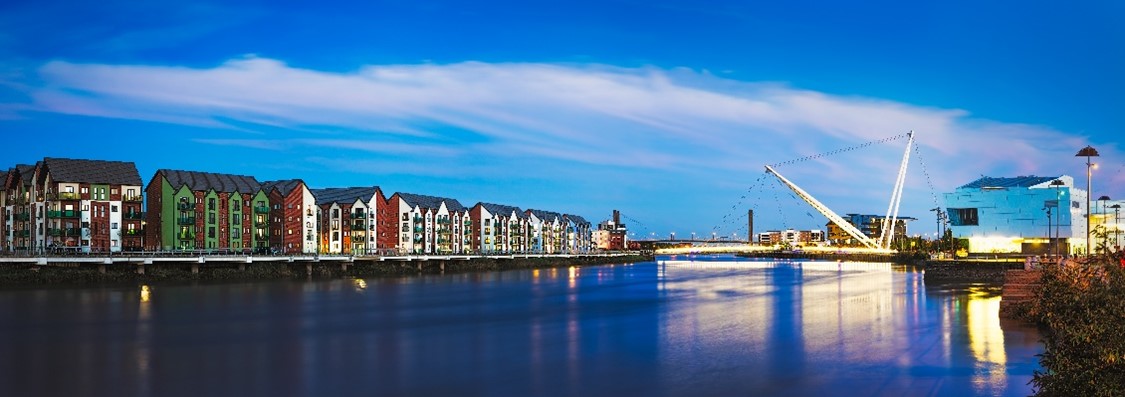
8. Exeter
Our research found Exeter to be the eighth most sustainable UK city to work in, with an overall score of 63% in the index. Exeter boasts 43 green spaces and parks (32 per 10,000 residents) and boasts 43 EV charging points and 17 EV stations per 100,000 residents, making this location more accessible for those commuting to work with electric cars.

9. York
In ninth place is York. This Northern city scored 62% in the index and has one of the highest numbers of cycle routes in the top 10 cities at 1,331 (631 per 10,000 residents).
Not only that, but York had one of the lowest number of emissions, at just 3 per km². However, there is only one B Lab certified company in York, highlighting there is room for improvement when it comes to businesses environmental impact in this city.

10. Manchester
Rounding off the top 10 most sustainable working cities is Manchester (62%). Surprisingly, Manchester had the highest number of emissions per km², beating London by 1.1. However, Manchester has over 1,600 employers with ‘sustainable workplace’ and ‘sustainable employer’ related job adverts, showing just how in demand a sustainable workforce is in this city.

Middlesborough Has the Most Room for Improvement When It Comes to Sustainability
On the other hand, we’ve also discovered the UK cities and towns where there is the most room for improvement when it comes to sustainability and environmental practices.
1. Middlesborough
Our research found the Northern town of Middlesborough to be the worst town for working in terms of sustainability in the UK, scoring just 19% overall in our study. Middlesborough has no B Lab certified employers, and not only that but this town only has 9 charging stations, which is just two for every 100,000 residents.
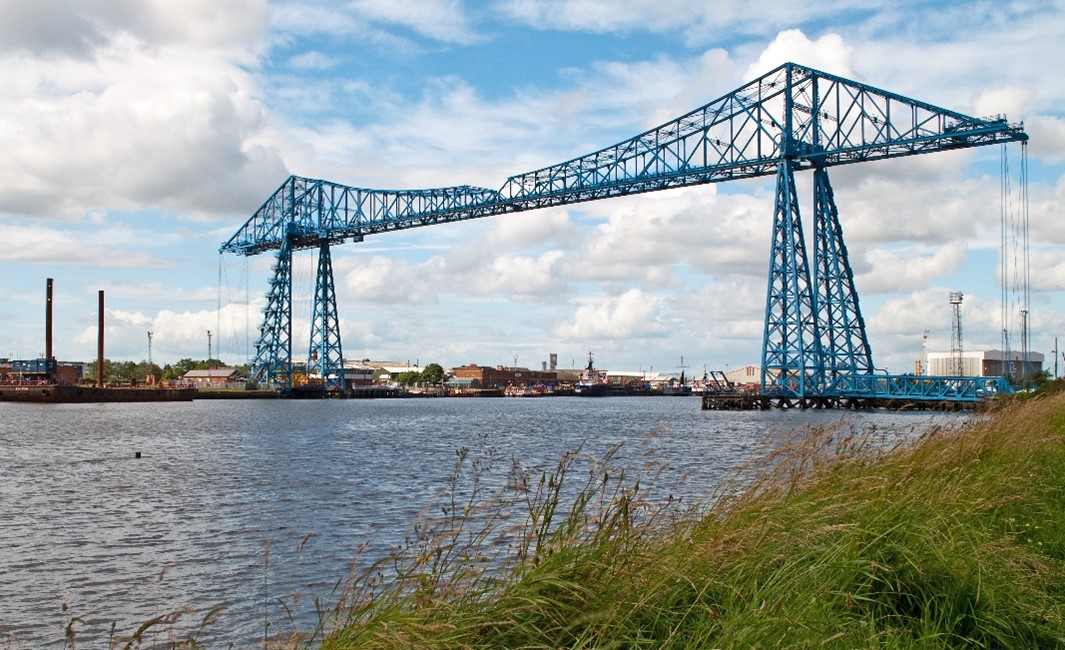
2. Plymouth and Portsmouth
Plymouth and Portsmouth follow behind Middlesborough, both achieving a score of 29% overall in the research.
Plymouth is home to just the one B Lab certified employer, and sadly had one of the lowest numbers of ‘sustainable employer’ and ‘sustainable workplace’ related job adverts at just 129 in total.
Whilst Portsmouth had the lowest number of EV charge points with just 25 around the city (12 per 10,000 residents) making sustainable commuting a challenge.
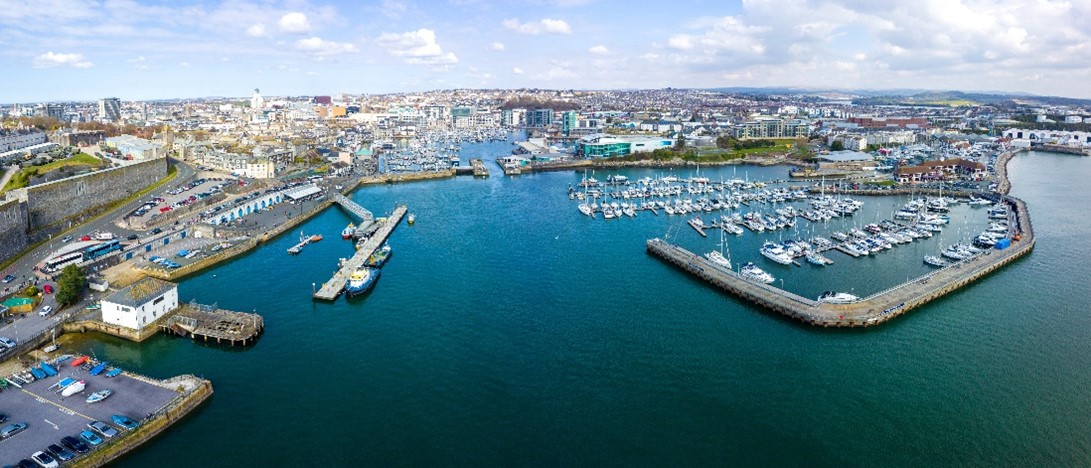
3. Bradford
Bradford ranked as the fourth worst UK city for sustainable working with an overall score of 30%. Our research found there are no B Lab certified employers in this area, and only four charging stations to choose from (just one per 10,000 residents).
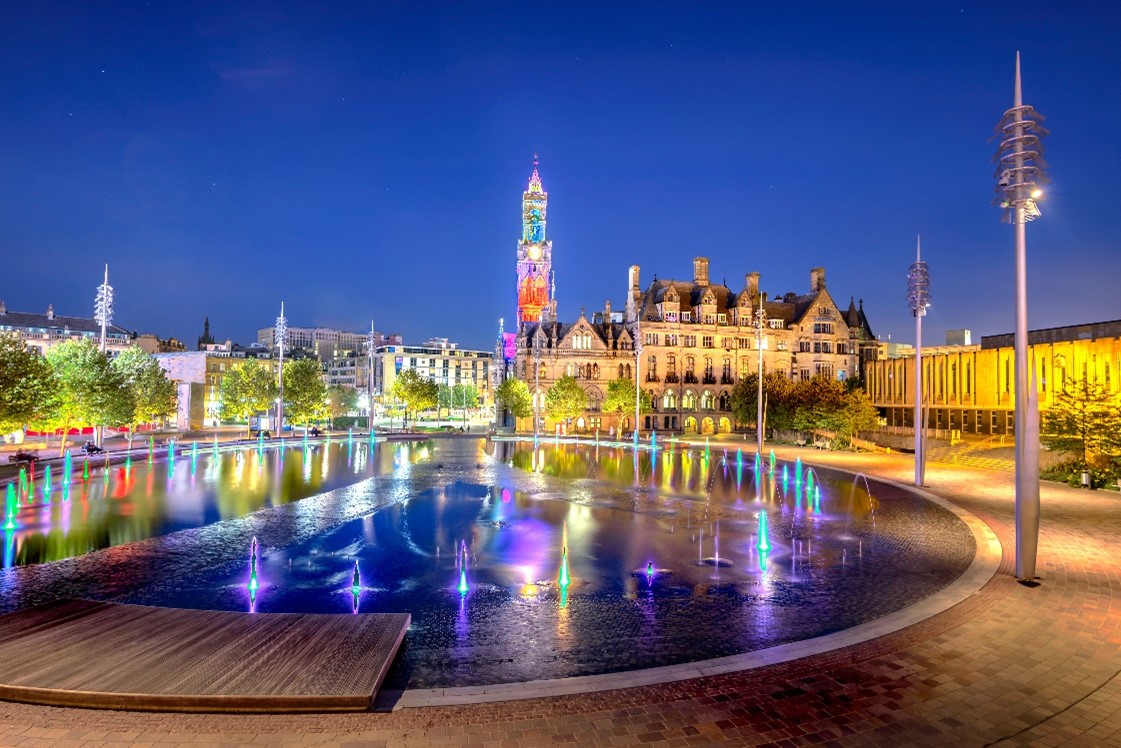
4. Dudley and Wolverhampton
In joint fifth place is Dudley and Wolverhampton, both scoring 36% overall.
The market town of Dudley has just 48 cycle routes (15 per 10,000 residents), the lowest number in the study, and not only that, but electric car charging is also limited, with just five stations around in the area (two per 10,000 residents).
Whilst in neighbouring Wolverhampton, there is just 10 green spaces and parks located around the city (four per 10,000 residents) which is the lowest number in the study.

Some of the Sustainable Steps UK Businesses are Already Introducing

Delving deeper on the topic of sustainability in the workplace, we also ran an FOI request with local governments to determine how businesses are enforcing sustainability and increasing environmentally aware practices.
This research revealed the top three most popular actions that UK businesses are taking to reduce their carbon emissions are adjusting heating and cooling systems, going paperless and switching to LED bulbs. Similarly, introducing a ‘cycle to work scheme’ is a popular action for businesses looking to improve sustainability, with over a quarter in Scotland (26%) South West (26%), North East (25%) and Wales (25%) adopting this approach.
Here at instantprint, we’re a host for Rotherham Council’s cycle club hub, meaning our employees can have their bikes serviced while at work. We also offer a bike loan service to encourage more of our employees to begin cycling to work.
Whilst for those looking to commute by car, in the North East and East Midlands, almost a third (31%) of businesses have installed charging points at places of work as an attempt to reduce carbon emissions.
Encouragingly, just 13% of UK businesses are currently taking no action whatsoever to reduce carbon emissions in the workplace. Shockingly, over a fifth of businesses in Northern Ireland (20%), South East (20%) and London (20%) are not intending to reduce carbon emissions in the next 12 months.
And according to ONS data that was highlighted to us via iur FOI request, the main factor that prevents UK businesses from taking action to prevent carbon emissions is the cost of doing so. This is most prominent in Northern Ireland (19%), Scotland (19%) and Wales (19%).
The Sustainable Steps We’re Taking at instantprint
At instantprint, we strive to better our sustainability practices and become more aware of our environmental impact as a business.
The Bluetree Group, which operates through instantprint, is certified as Carbon Neutral under the Achilles Carbon Zero scheme, where we measure and reduce our greenhouse gas emissions in accordance with ISO14064 and offsetting our Carbon using Gold Standard offsets. We’re also ISO14001 and FSC certified - which is something we’re proud to have achieved.
Not only that but between 2020 and 2022 Bluetree experienced both absolute and intensity reductions, where the group emitted 46.6% less Carbon throughout the year. These reductions can be attributed to:
• The transition to renewable electricity tariffs, IP runs on 100% renewable electricity.
• Transitioning to an electric forklift fleet
• Rigorous artwork checks to ensure excellent quality and eliminate waste associated with reprints.
And sitting within the printing division of the group, instantprint have contributed to additional environmental improvements, including:
• Packaging improvements such as the use of kraft tape, recycled void fill and introducing a wider range of box sizes had resulted in a significant reduction in packaging used to distribute products to customers.
• Automatic timers have reduced the spot-UV drying process by 20%
• The efficiencies taskforce has made huge improvements across the Litho stream, improving plate efficiencies by 5% and reducing make ready sheets.
• We also offer a range of sustainable printing, where you can choose from a range of recycled flyers, business cards, greeting cards and invitations.
Conclusion
Our annual staff sustainability survey revealed that 85% of instantprint employees agree that sustainability is everyone’s responsibility, highlighting that the team are dedicated to contributing to the targets of the strategy, and showing exactly how sustainability is an important topic company wide.
In terms of next steps, we’re currently working towards having solar panels installed this Spring, taking our sustainability measures to the next level.
Whether you’re a hybrid worker, or a flexible worker, don’t forget to be a sustainable worker too. Here at instantprint, we’re pleased to see the measures other businesses have taken to improve sustainability practices, particularly those in Bath!
Sources and Methodology
• Survey of 2,000 UK workers currently in employment correct as of January 2023.
• Emissions Data Emissions per km2 (kt CO2e) - https://www.data.gov.uk/dataset/723c243d-2f1a-4d27-8b61-cdb93e5b10ff/uk-local-authority-and-regional-greenhouse-gas-emissions
• Number of green spaces – Gov.uk (https://www.york.gov.uk/parks)
• Number of cycle routes - https://www.bikemap.net/
• Number of EV Charge points - https://www.zap-map.com/statistics/#:~:text=The%20geographical%20area%20that%20has,4351%20and%20Scotland%20with%203012
• Number of charging stations - https://chargemap.com/cities/aberdeen-GB#:~:text=Come%20and%20charge%20your%20electric,town%20boasts%2028%20charging%20stations.
• No. of employers with "sustainable workplace" related job listings (or similar) within 25 miles - https://uk.indeed.com/?r=us
• Number of B Lab Certified Employers - https://www.bcorporation.net/en-us/find-a-b-corp/
• FOI Request was conducted in January 2023 to determine how businesses are enforcing sustainability in the workplace.
• Google search vols retrieved from Google Keyword Planner, accurate as of 16/02/2023

.jpg)


.jpg)
